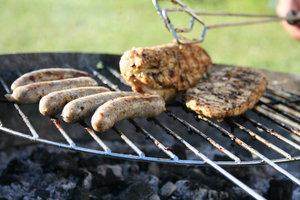 Fire Up the Grill! It’s grilling season. Even the latest Dietary Guidelines for Americans recommends grilling (as well as broiling, poaching and roasting) as a good way to cook foods to avoid adding extra fat.
Fire Up the Grill! It’s grilling season. Even the latest Dietary Guidelines for Americans recommends grilling (as well as broiling, poaching and roasting) as a good way to cook foods to avoid adding extra fat.
Grilling is a healthy way to prepare meat without adding the fat of pan frying. However, potentially cancer-causing chemicals are produced when cooking meat, poultry and fish over high heat, especially if you cook to well done or charring. Many factors can increase your risk of cancer but consuming grilled meat and well-done or very well-done meat was associated with a greater than 50% increased risk. Another study indicated an increased risk of prostate cancer with a high intake of well-done grilled or barbecued red meat. Well-done, boneless, skinless chicken breast; well-done grilled steak; barbecued pork; salmon grilled with skin; and well-done and grilled hamburger contained the highest amounts of cancer causing chemicals.
How can you reduce your risk and enjoy grilled foods?
• Vegetables and fruits can be grilled without concern but using lower temperatures will help retain nutrients. Enjoy lots of grilled fruits and vegetables.
• Use lower grilling temperatures to cook your meats. In one study grilling salmon at about 350-400 degrees Fahrenheit resulted in lower cancer-causing chemicals than salmon grilled at about 500 degrees.
• Marinating foods prior to grilling helped lower cancer-causing chemicals from being produced. One study showed that marinating an hour in commercial marinade prepared with oil, water and vinegar reduced the cancer-causing chemicals by 57% to 88%. You can also just marinate meat in oil, water and vinegar. Be sure to refrigerate while marinating to keep food safe.
• If you use gas, charcoal or wood, keep flare ups to a minimum if possible. If you use a charcoal grill, always start with fresh charcoal. Using the same charcoal will cause more flare-ups from previously dripped fat, which resulted in higher levels. You also might try coconut-shell charcoal. They produced fewer cancer-causing chemicals than regular wood charcoal.
• Choose lean cuts of meat and trim any visible fat.
• Precook meat to shorten the grilling time. Microwaving for a short time can help start the cooking process so it is not so long on the grill.
• Avoid putting frozen meat on the grill which lengthens the cooking time. Thoroughly defrost meat in the refrigerator before grilling.
• Use smaller cuts of meat or cooking kabobs which reduce cooking time.
• Try to finish grilling meats away from the direct heat. Pile coals to one side of the grill or leave half of the burners off on a gas grill and finish grilling on the cooler side away from direct heat.
• Cook on a water-soaked cedar plank which protects the food from direct flames.
• Use aluminum-foil packets with meat and veggies in a single packet or line your grill with foil to prevent direct contact.
• Grill only to medium well and use a meat thermometer to make sure the internal temperature reaches 160⁰ for ground meats, 165⁰ for poultry, and 145⁰ for whole cuts of pork, beef and lamb.
• If food becomes charred, remove that portion before eating.
You can enjoy using the grill and having grilled meat, vegetables and fruits. Take some precautions when grilling meat and enjoy the summer.
Written by: Pat Brinkman, Extension Educator Family and Consumer Sciences
Reviewed by: Melinda Hill and Donna Green, Extension Educators Family and Consumer Sciences
Reference:
Tufts University, [July, 2012}. Grill Power! Keep Your Summer Grilling Healthy and Safe. Tufts University Health & Nutrition Letter, Vol.30 (5)

